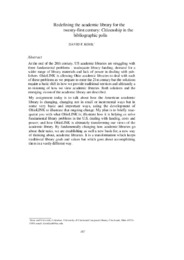Redelining the academic library for the twenty-first century: citizenship in the bibliographic polis
Abstract
At the end of the 20th century, US academic libraries are struggling with three fundamental problems - inadequate library funding, demand for a wider range of library materials and lack of power in dealing with publishers. OhioLINK is allowing Ohio academic libraries to deal with each of these problems as we prepare to enter the 21st century but the solutions require a basic shift in how we provide traditional services and ultimately a re-visioning of how we view academic libraries. Both solutions and the emerging vision of the academic library are described. My assignment today is to talk about how the American academic library is changing, changing not in small or incremental ways but in some very basic and important ways, using the development of OhioLINK to illustrate that ongoing change. My plan is to briefly reac-quaint you with what OhioLINK is; illustrate how it is helping us solve fundamental library problems in the U.S. dealing with funding, costs and power; and how OhioLINK is ultimately transforming our views of the academic library. By fundamentally changing how academic libraries go about their tasks, we are establishing as well a new basis for, a new way of thinking about, academic libraries. It is a transformation which keeps traditional library goals and values but which goes about accomplishing them in a vastly different way.
